E tū turns 10!
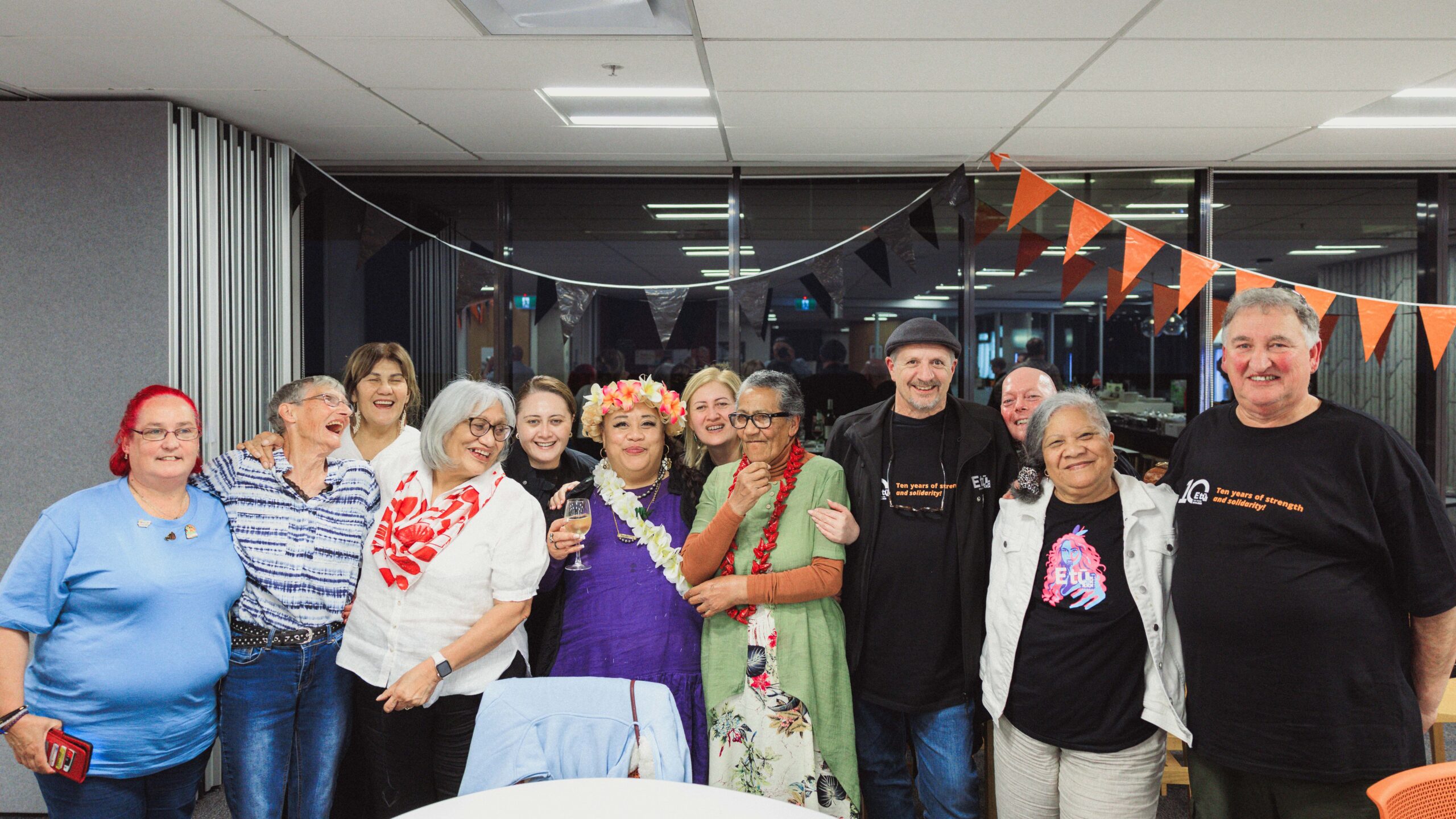
Last month we marked ten years since E tū was formed from the strength of three proud unions becoming one. Across the country, members came together to celebrate our history, honour our wins, and look ahead to the organising challenges of the next decade.
Members shared stories of the big campaigns that shaped E tū: Living Wage victories, our historic pay equity win for care and support workers, and the massive effort to protect jobs and rights through crises like Covid and the ongoing cost-of-living crunch.
Our celebration also included a nationwide competition for members to create videos about what E tū means to them. Check out this excellent entry from our winner, Jason Fell:
If you want to dig deeper into our story, you can read former Assistant National Secretary John Ryall’s reflections on the formation of E tū here, as well as National Secretary Rachel Mackintosh’s piece on where we go from here.
Ten years of E tū means ten years of building workers’ power. Now we get ready for the next ten.
Local elections build our power to win
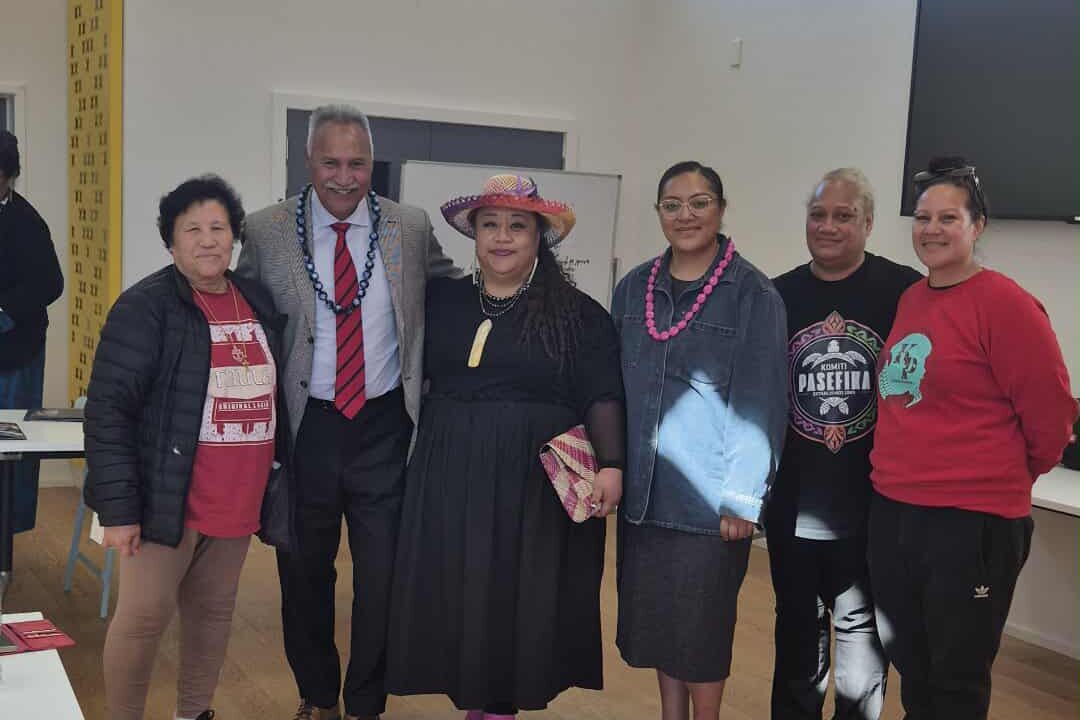
This year’s local elections were an important chance to make sure workers’ voices are represented across councils and other local authorities. Councils make decisions about housing, transport, water, libraries, and local services. Worker-friendly leadership matters.
E tū members got stuck in again this year, supporting candidates who back decent jobs, protecting our public services and facilities, and were committed to progressing or maintaining accreditation as a Living Wage Council.
There were some big wins for our movement. In Wellington, former EPMU National Secretary Andrew Little won the mayoralty in a landslide. In Hutt City Te Awa Kairangi, long-time E tū member and community leader Ken Laban became Aotearoa’s first Pasefika mayor.
Central Regional Representative Nia Bartley says: “As a fellow tagata Pasifika unionist from working-class roots, I, along with many others, am proud of this momentous achievement. He will lead the most diverse and inclusive council this region has ever seen. The benefits of his leadership and experience will extend beyond Lower Hutt and the wider Wellington region, which has the second-largest tagata Pasifika population after Auckland, as he works to lift up all our communities.”
These results show what happens when workers get organised. Local leadership matters for our jobs, our whānau, and our communities.
The Living Wage is here to stay in the public service
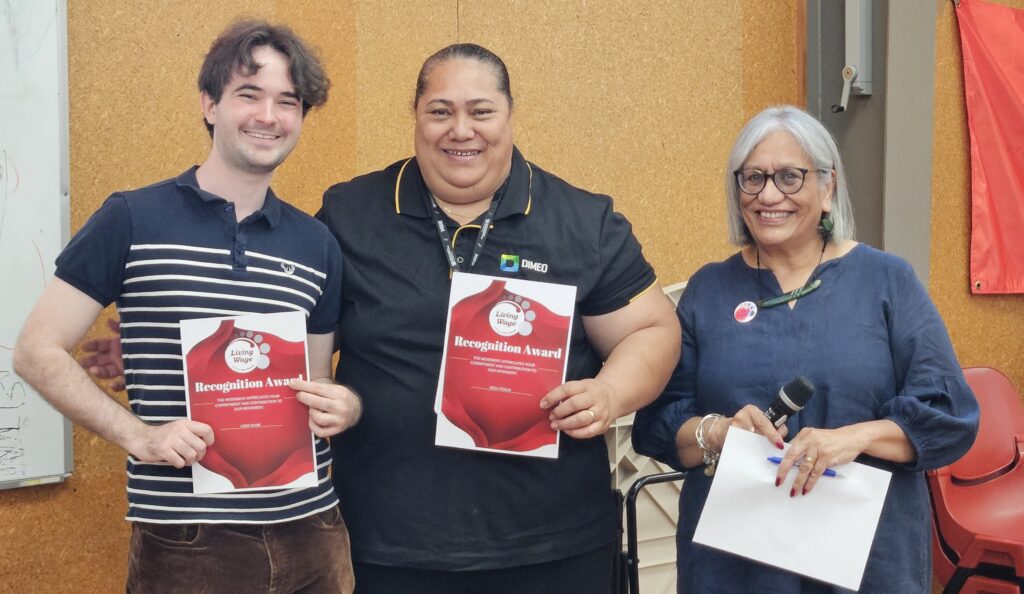
Some fantastic news for thousands of the lowest paid workers in Aotearoa. The Government has backed down on its plan to remove the Living Wage requirement from the Government Procurement Rules.
This rule ensures that cleaners, security guards, and catering staff working in government buildings are paid at least the Living Wage. These workers are employed by contractors, not directly by government agencies, so without the rule they would have no protection from low-wage undercutting.
This didn’t happen on its own – E tū members and Living Wage Movement fought hard for this result. We coordinated hundreds of submissions, lobbied MPs, and kept the issue in the media spotlight. A poll commissioned by E tū earlier this year showed overwhelming public support for saving the Living Wage. The pressure worked.
Cleaner and E tū delegate Liam Shaw says: “Winning this fight demonstrates our strength as a community, and what we can achieve when we stand firm together. The Living Wage lets us afford rent and kai, and allows us to get through the week with less stress. Keeping this rule in place means the Government can’t force us backwards. Let’s keep the momentum going!”
A good win, delivered by workers organising together.
Uber victory at the Supreme Court

It’s official. The Supreme Court has thrown out Uber’s final appeal, confirming once and for all that Uber drivers are employees under New Zealand employment law. There are no further appeals. This is the highest court in the land saying clearly that platform workers deserve real employment rights – just as we’ve known all along.
The Court ruled that Uber exercises a very high level of control over drivers: setting prices, deciding who gets work, managing customer relationships, enforcing performance standards, and determining access to the platform. That means drivers are legally employees, with rights to minimum wage, holiday pay, sick leave, and the ability to challenge unfair treatment.
But this historic win comes at the same time the Government is trying to change the law so workers like Uber drivers are unable to challenge their employment status in court at all. It is a direct attempt to undo the victory.
Wellington City Councillor and former Uber driver Nureddin Abdurahman says:
“This decision proves what we always knew. Drivers are workers, not contractors. The Supreme Court has backed us, so now politicians need to decide whether they stand with working people or with a multinational corporation. They should think very carefully before trying to take away our right to be treated fairly.”
Air New Zealand cabin crew to take full-day strike for a fair deal
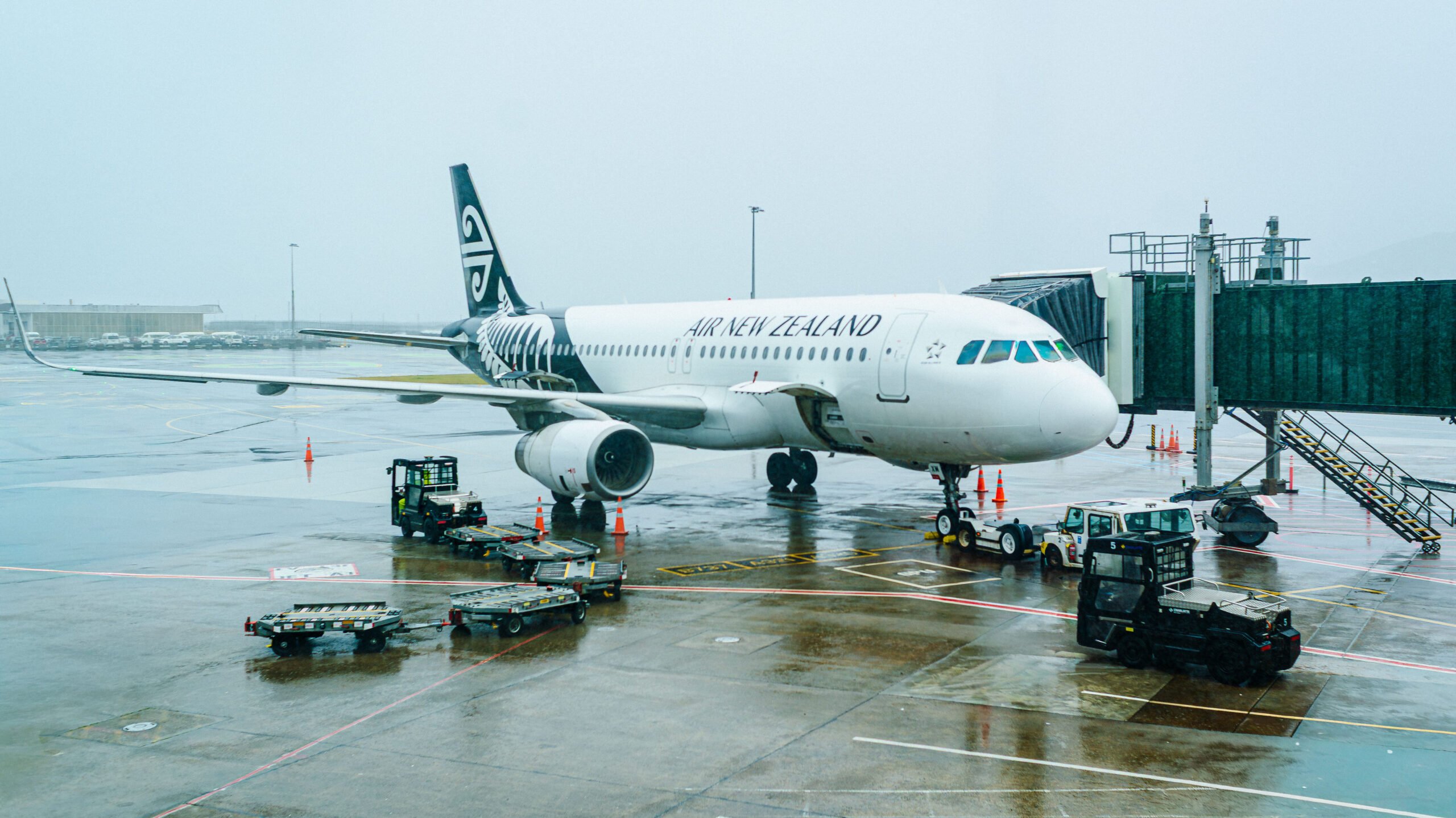
Around 1250 cabin crew across Air New Zealand will take a historic full-day strike on 8 December, after seven months of stalled bargaining. Crew across international, domestic, and regional fleets voted overwhelmingly to take action after repeated attempts to secure a fair deal were ignored.
Crew say the company wants to increase productivity even further, despite rosters already pushing people to the edge of fatigue. Fatigue in aviation is a serious safety issue that affects both crew and passengers. While crew are seeking a modest pay increase that keeps up with inflation, Air New Zealand wants them to trade away important conditions that protect wellbeing.
One cabin crew member says: “The company keeps talking about efficiency, but the current schedules already stretch us. Asking for more means choosing between safety and exhaustion. We want a fair pay rise without giving up the conditions that keep us and our passengers safe.”
This will be New Zealand’s biggest ever cabin crew strike. Solidarity with Air New Zealand cabin crew!
Resene workers strike again after a pathetic pay offer
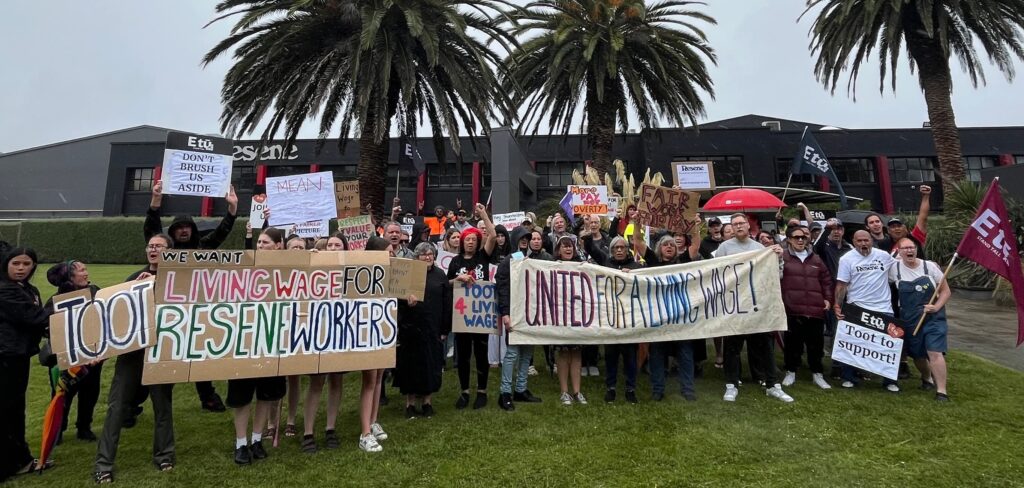
Resene workers are back on strike after the company’s latest offer again failed to deliver the Living Wage. Members at the Wellington plant say the offer is not enough to cope with the rising cost of living, and they feel that the company sees them as “just numbers”, not the people who create its profits.
E tū delegate Mags Jackson says: “We’re striking because Resene still won’t pay the Living Wage. Their offer makes us feel like we don’t matter. It’s disappointing and pretty insulting.”
E tū delegate Lui Betham says: “We’re doing this to show that we deserve better. The Living Wage isn’t luxury money, it’s the basics. We’re ready to keep going.”
The community has shown huge support, including through donations, messages, and regular community pickets outside the Resene head office. Workers say it has kept spirits high through a tough fight – a clear demonstration of the community power we can use in industrial campaigns.
Rā Whakamana brings unions and iwi together for action
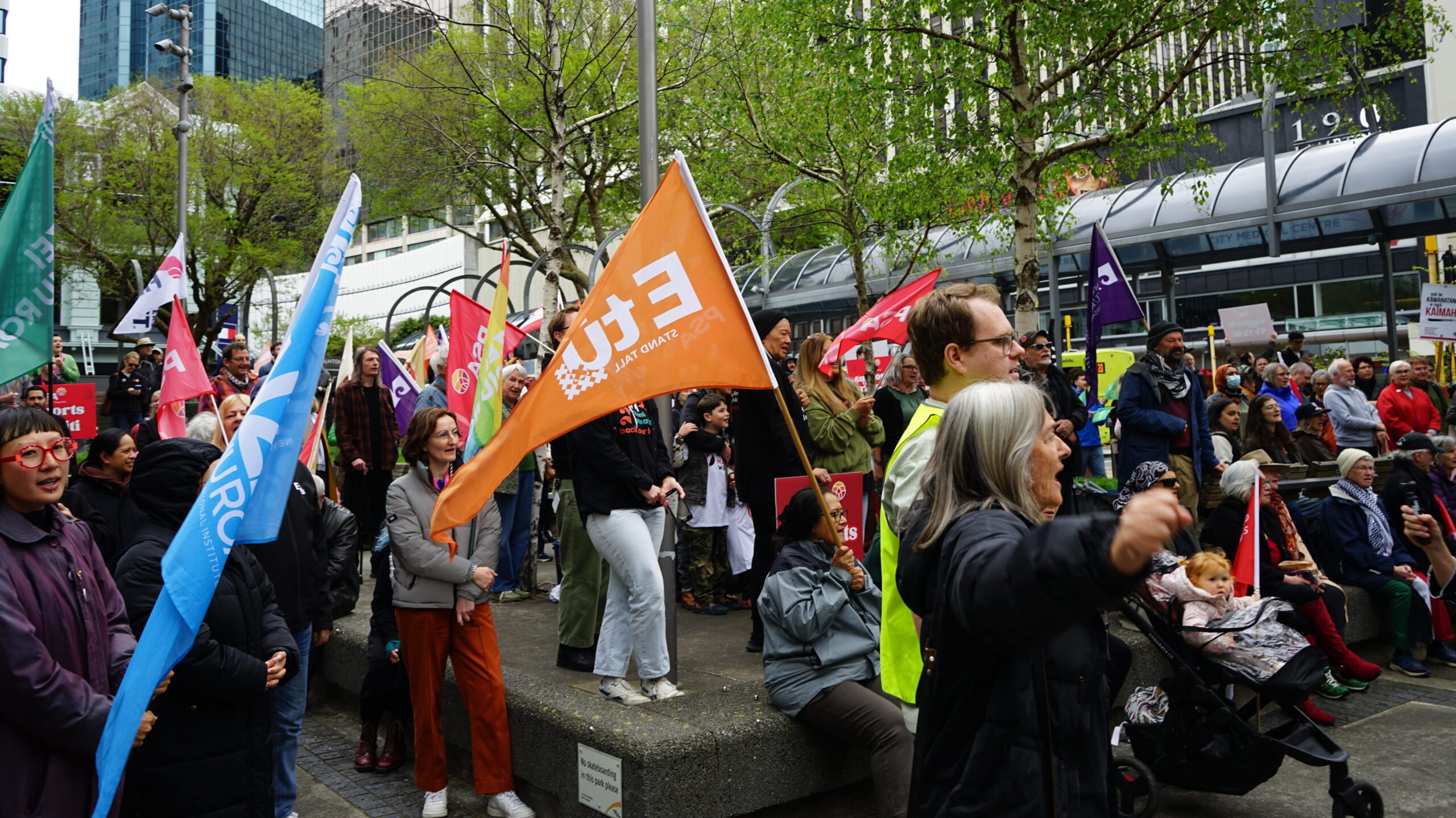
On 28 October, iwi, unions, and community allies gathered across the motu for Rā Whakamana, a national day of solidarity led by iwi and the union movement. Events took place in cities and towns nationwide, with an opportunity for each area to
Rā Whakamana was about standing together for tino rangatiratanga, mana wāhine, rangatahi, and the rights and dignity of all workers. Although the Treaty Principles Bill was defeated earlier this year, the Government continues to attack Te Tiriti and workers’ rights.
Muriel Tunoho, E tū President, says: “Rā Whakamana shows that we won’t be divided. Tangata Whenua and Tangata Tiriti are standing together. Even though the bill is gone, the attitudes behind it are still here, and so is our determination to uphold Te Tiriti.”
E tū members turned out in large numbers. The message was clear: as some of the strongest civil society institutions in Aotearoa, iwi and unions will stand strong to fight for what we need, and what we deserve.
Marking 15 years since Pike River
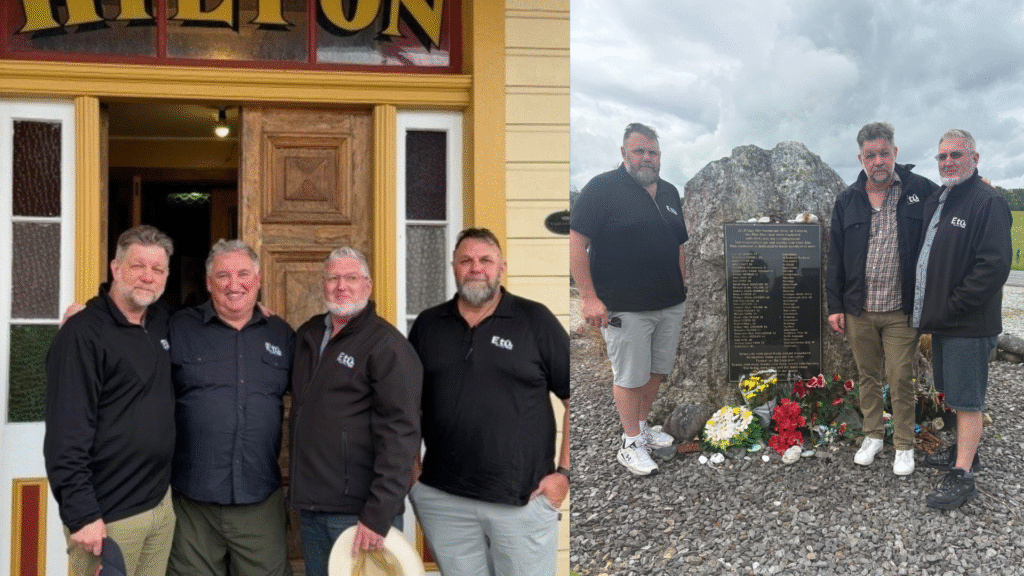
This month marks 15 years since the Pike River disaster, when 29 men lost their lives and families were left with heartbreak that endures to this day. It remains one of the darkest chapters in Aotearoa’s industrial history and a stark reminder of why strong health and safety protections matter.
A small E tū group travelled to the Coast to pay respects. They first stopped at the roadside memorial below the mine, arriving by coincidence at almost the exact time the first explosion occurred in 2010. Standing in that place, they said the emotion was immediate and heavy.
They then joined the community memorial in Blackball, where speakers, including Jan Tinetti and family members, shared the same message: we cannot let this tragedy be forgotten, and the legacy of the 29 is the Health and Safety at Work Act.
Mark Anderson says the importance of that legacy was front and centre: “We heard again that the Health and Safety at Work Act is written in their blood. We cannot let anyone take the teeth out of the legislation or weaken the inspectorate. We demand accountability. The 29 deserve nothing less.”
E tū continues to stand with the Pike River families and the West Coast community to protect safe work for all.
E tū Out@Work hui March 2026

E tū’s Out@Work Network is taking a big step forward for Rainbow representation next year, with plans underway for its first ever national hui.
The hui will be held from 26–27 March 2026 and will bring together LGBTTQIA+ members from workplaces right across Aotearoa. It is the beginning of a wider plan to strengthen visibility, connection, and leadership for Rainbow workers across the union.
Out@Work convenor Liam Bloomfield says the hui marks a milestone for the network.
“This is a huge opportunity for our members in the Rainbow community. It is a first step to improving representation and visibility, and it builds towards our strategic goal for E tū to be the safest union for Rainbow people in Aotearoa,” Liam says.
“We want to connect with as many Rainbow members as possible. Whether you want updates about the hui or you simply want to meet others across the union, we would love to hear from you.”
If you are interested in attending the hui or joining the network, email outatwork@etu.nz to stay in the loop.
